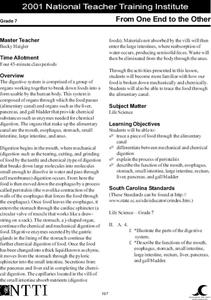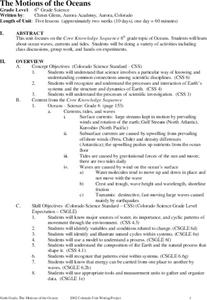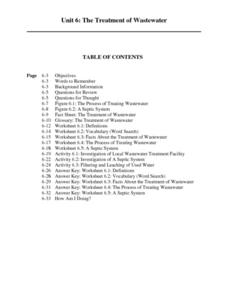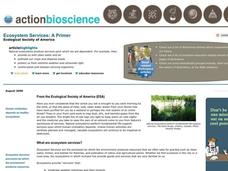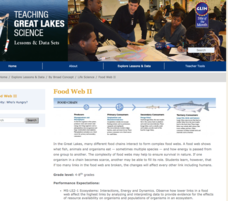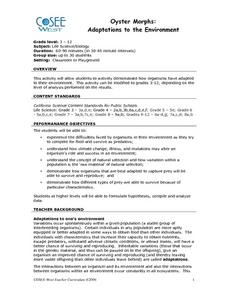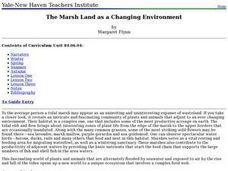Curated OER
What Plants Need in Order to Survive and Grow: Soil
Students conduct an experiment to evaluate whether plants need soil to survive and grow. They plant two seeds, one with soil and one without, make predictions, and record and analyze the seed germination results on a worksheet.
Curated OER
From One End to the Other
Seventh graders trace a piece of food through the digestive system. They describe the functions of the mouth, esophagus, stomach, etc.
Curated OER
The Gulf of Maine
Students examine the effect of limiting factors, especially when it comes to human beings. They examine data from the Gulf of Maine area.
Curated OER
Food For Thought
Students create an individual menu for one of their peers. They must examine their peer's activity level and family history.
Curated OER
Ocean Life
Students explore the topics of ocean water salinity, ocean life zones, marine life classification, and ocean food chains. They observe demonstrations, conduct experiments, complete quizzes and handouts, and analyze key vocabulary.
Curated OER
The Motions of the Oceans
Students examine the topics of ocean waves, currents, and tides. They locate and label ocean currents on a world map, conduct experiments, analyze key vocabulary, view demonstrations and record the data, and complete handouts.
Curated OER
The Treatment of Wastewater
Students, through a series of lessons, study the various processes of treating wastewater. They participate in discussion and complete various worksheets and a hands-on activity, in which they observe the processes of filtration and...
Curated OER
Earthworm Animation
Students use animation to create their own earthworm catching and eating its prey. They must draw storyboards before they start on the animation.
Curated OER
Bog Science
Students study bogs. They tour, collect physical, chemical, and biological data and analyze a pristine bog community. Using the data, they draw a map and a cross section of the bog.
Curated OER
How Much Is an Ecosystem Worth?
Students examine the value of ecosystems. They read and analyze an article, evaluate ecosystem services, research the benefits of biomonitors, and design a public service announcement.
Curated OER
Make your Garden Grow
Fourth graders role play as certified horticulturists as they study the biology of plants and gardening. They design a garden for their school based on what they researched and a given budget.
Curated OER
The Gray Whale Obstacle Course Viewing Guide
Students complete a worksheet while watching a film about whales. They examine the human impact on whale migration and identify adaptations the whale has acquired in able to survive. They discover how global warming has effected the...
Curated OER
Soil Recipe
Students examine the components of soil. They work together to use different materials to create their own soil. They make their own dirt cake as well.
Michigan Sea Grant
Wetlands
Wetlands may not sound particularly ornate, but they are as important as any habitat! With a hands-on activity, young scientists build a wetland model and observe its many functions in action. They discover the importance of wetlands to...
Michigan Sea Grant
Food Web II
A food web consists of complex food chains and the more complex the web, the better likelihood of survival. Learners compare and contrast food webs and food chains and discuss concepts like the predator-prey and consumer-producer...
Curated OER
Oyster Morphs: Adaptations to the Environment
Students demonstrate how organisms adapt to their environment. They examine prey and predators, natural selection, and adaptations by representing oyster morph.
Curated OER
Bacteria: The good, the bad, the ugly
Seventh graders conduct an experiment. In this bacteria lesson, 7th graders list living and nonliving things and brainstorm the characteristics they share. Students are divided into two groups where they put samples of hand...
Curated OER
What's Outside the Cell Membrane ?
Students examine the cell coats (matrix) of chondrocytes and fibroblasts and observe these cells actively exclude particles which are released around them. They observe the function of the cell membrane as a gatekeeper as it prevents...
Curated OER
Translating Genetic Information
Students explore the process of translation. They determine the correct sequencing and present their strands to the class. In addition, they compare normal red blood cells to sickle cells and complete discussion questions.
Curated OER
Rivers
Students examine how rivers are used in our modern world. They create and analyze a large class mural of a river illustrating the ways rivers are used by people and wildlife, and write an essay on how rivers should be used and why.
Curated OER
The Marsh Land as a Changing Environment
Sixth graders continue their examination of the state of Connecticut. After taking a field trip, they identify the types of birds, plants, invertebrates and vertebrates who make their home in the salt marshes. In groups, they identify...
Curated OER
Oil Spill
Students explore an important role of environmental engineers by studying the Exxon Valdez oil spill. They experiment with different strategies in order to clean up their own manufactured oil spill.
Curated OER
It's all In the Package
Students examine the concept of reducing solid waste and how it relates to product packaging. They read about and evaluate the packaging decisions of two major U.S. corporations, develop a t-chart comparing the pros and cons of various...
Curated OER
Food Myths Critical Thinking and Reading
Students read a series of statements made by students about the hazards and benefits of various foods. They distinguish the "facts: from "opinions" in the dialogue, summarize the facts in a short paragraph, and write an essay...
Other popular searches
- Six Essential Nutrients
- Plant Growth Nutrients
- 6 Basic Nutrients
- Essential Nutrients
- Nutrients in Food
- Digestion of Nutrients
- Six Nutrients
- Plant Nutrients
- Food Nutrients
- Excess Nutrients
- Nutrients Fat
- 6 Essential Nutrients

